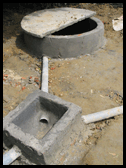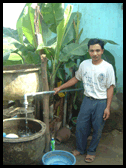
Water, Sanitation and Hygiene Programs
The very basics of life for every person involve drinking water and disposing of excrement – actions we can usually take for granted in Australia. However, around the world over one billion people do not have access to safe water and about 2.5 billion live without adequate sanitation.

In poorer countries it is usually the remote rural areas that lack access to facilities and the education necessary to improve their environment and living conditions. However, increasing migration to urban slums presents a growing problem.
Diarrhoea kills about 2.2 million people each year, most of them children under five in developing countries. The World Health Organisation has estimated that 88% of the global burden of disease due to diarrhoea was attributable to unsafe water supply, sanitation and hygiene. The prevalence of intestinal worms and other parasitic diseases related to excreta disposal is very high amongst poor communities and directly impacts the nutritional status and productivity of families. A great deal of this human suffering and loss is preventable.

In spite of this apparently overwhelming situation there are appropriate technologies and methods available and a resolve within Chandelier and our partner organisations to bring change. Chandelier’s philosophy towards water, sanitation and hygiene education includes:
- Community-based projects undertaken using participatory learning methods
- Interventions that can be adopted and scaled up by local people or institutions
- An emphasis on baseline surveys, monitoring and project evaluation to ensure sustainability
- Training and hygiene promotion as a critical component of every project
- Partnership with other agencies
Chandelier Ministries is looking to bring advice and training in environmental health engineering (water and sanitation) and health promotion and to assist churches and other organisations on short-term assignments with project planning, implementation and evaluation.
